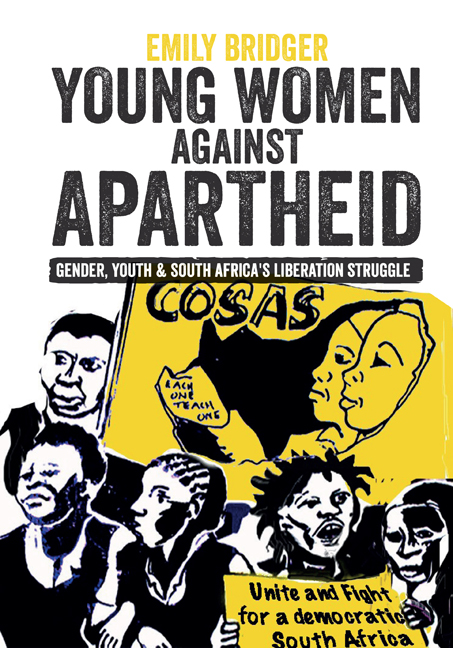Book contents
- Frontmatter
- Dedication
- Contents
- Acknowledgements
- List of Acronyms and Abbreviations
- Glossary
- Map of Soweto
- Introduction
- 1 African Girlhood under the Apartheid State
- 2 The School: Becoming a Female Comrade
- 3 The Home: Negotiating Family, Girlhood, and Politics
- 4 The Meeting: Contesting Gender and Creating a Movement
- 5 The Street: Gendering Collective Action and Political Violence
- 6 The Prison Cell: Gender, Trauma, and Resistance
- 7 The Interview: Reflecting on the Struggle
- Conclusion
- Bibliography
- Index
- Related James Currey titles on South & Southern Africa
5 - The Street: Gendering Collective Action and Political Violence
Published online by Cambridge University Press: 09 February 2021
- Frontmatter
- Dedication
- Contents
- Acknowledgements
- List of Acronyms and Abbreviations
- Glossary
- Map of Soweto
- Introduction
- 1 African Girlhood under the Apartheid State
- 2 The School: Becoming a Female Comrade
- 3 The Home: Negotiating Family, Girlhood, and Politics
- 4 The Meeting: Contesting Gender and Creating a Movement
- 5 The Street: Gendering Collective Action and Political Violence
- 6 The Prison Cell: Gender, Trauma, and Resistance
- 7 The Interview: Reflecting on the Struggle
- Conclusion
- Bibliography
- Index
- Related James Currey titles on South & Southern Africa
Summary
Born in Diepkloof, Soweto in 1969, Lucy first became involved in South Africa's liberation struggle through her school's SRC around the age of fourteen. As an SRC representative she campaigned against the poor quality of education in her school – Bopasenatla Secondary – and was soon encouraged to join COSAS by older, male student activists. Lucy was an excellent storyteller – a quality which led me to interview her several times over three years. In each of our meetings she discussed her childhood experiences of racialised inequality, her views on gender, and the strong relationships she forged with her male comrades. Yet almost an hour into our first interview I still had little sense of her day-to-day tasks and activities as a comrade. ‘Can you tell me a bit more about some of your tasks?’ I asked. ‘Or what activities you participated in?’ Lucy responded:
We used to participate in all, in all of the tasks. There were boycotts…when we’re boycotting the buses and all those things, we used to go there and [laughs] hit the buses, throw stones to hit the buses. When maybe we were boycotting the shops, like Pick n Pay and all those things, when [pauses], maybe you come out of the bus with grocery we used to take them and throw the groceries all over the place [laughs]. So we used to do the same things with the males.
After experiencing a number of attacks from police and security forces at school or in Soweto's streets, Lucy learned to walk around the township with her pockets full of stones so that she would always be ready to fight. ‘They were so heavy,’ she lamented, ‘but we know we have to fight’. ‘Sometimes,’ she continued, ‘we’ve got matches and all that. Then when they come and attack us, we have to attack back with petrol bombs.’
Throughout our interviews, Lucy's description of her ‘tasks’ as a comrade repeatedly focused on confrontations in Soweto's streets such as those described above. She spoke candidly about throwing stones at police vehicles, making and using petrol bombs, and punishing suspected gangsters or informers. She repeatedly emphasised how her actions in the struggle were no different from those of her male comrades. Lucy's memories contrast starkly with depictions of township streets during the 1980s as deeply masculine spaces, ‘clearly demarcated as the social territory of young men only.’
- Type
- Chapter
- Information
- Young Women against ApartheidGender, Youth and South Africa's Liberation Struggle, pp. 127 - 162Publisher: Boydell & BrewerPrint publication year: 2021



